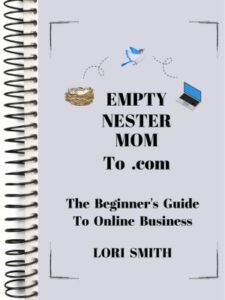As a mom who took care of everybody else for so many years, your health may have been pushed by the wayside. If so, it’s time to make your health a top priority, which is an important part of reconnecting with yourself.
Why Should Empty Nester Moms Focus on Their Health?
Full Disclaimer: I am not a doctor and this is not medical advice—it is simply informational content based on my own personal experiences.
This page may contain affiliate links, which means I will receive a commission if you purchase through my links, at no extra cost to you. Please read full disclosure for more information.
Discover Your New Identity
For years, your identity has been “Mom.” Now that your kids are grown and gone, it’s time to revisit yourself!
While focusing on your physical health, check in with your mental and spiritual health to rediscover who you were before starting your family. This will include your interests, passions, talents, hobbies, strengths/weaknesses, and more, giving you a renewed sense of self and allowing you to move beyond the empty nest.
Enhance Longevity and Quality of Life
While age might be just a number, the aches and pains are real!
There’s just no gettin around it—it’s hell gettin’ old, BUT it sure beats the alternative!
If you start investing time in your health again, it can help to prevent problems down the road. Focusing on your health will help maintain mobility and muscle, as well as prevent injuries and chronic conditions, all of which will enable you to enjoy a high quality of life in later years.
Reclaim Time and Energy for Self-Care
With your day-to-day parenting tasks behind you, you should have more time and energy to pursue your fitness goals that may have been put on hold.
Know Your Family Health History
Understanding your family health history is crucial in tailoring your health regimen. Whether it’s heart disease, diabetes, or osteoporosis, knowing your family’s medical background can guide you in taking preventive measures and making informed health decisions.
How Empty Nester Moms Can Focus on Their Health
1. Be Your Own Health Advocate
My mom (who is no longer with us) had a lot of health battles!
In her 30s, she developed psoriasis which eventually spread to her entire body. When I say entire body, think ENTIRE body! Note how I capitalized, bolded, and italicized that word? If there were more ways to highlight it, I’d do it. It was awful!
While trying to combat her psoriasis with doctor-prescribed methotrexate, my mom developed cirrohsis of the liver. As if that wasn’t bad enough, she had breast cancer, which metasticized to her lungs and took her life at 70 years old. Too young! I have to say, my mom was definitely a trooper!
My mom also had high cholesterol and high blood pressure, which led to carotid artery surgery in her early 40s, and a heart attack at just 53 years old! With her mom having a stroke at passing away at 58, and all three siblings having heart bypasses, with one passing away at only 42-years old and the others in their early 60s, she had terrible family health history! Which, unfortunately, has been passed down to me and my siblings.
Throughout her struggles, I’ll never forget my mom telling me repeatedly, “You have to be your own healthcare advocate!” If she told me that once, she told me a thousand times—usually when she just got off the phone with one of her doctors, or struggling with her insurance company.
Let’s face it, doctors see many patients every day, so they can’t possibly monitor your health the way you can do for yourself. If you have a spouse or other family member looking after you, of course that’s a bonus, but not everybody does.
2. Adopt a Balanced Diet
Eating healthy is essential for energy and well-being. A balanced diet can help manage weight, boost immunity, and reduce the risk of chronic diseases.
Tips:
- Understand Your Body’s Nutrient Needs: Use a food tracking app to monitor your nutrient intake. Make adjustments, as necessary, with your family health history in mind (ie, reducing sodium if hypertension is a concern).
- Eat a Variety of Foods: Mix up your choice of fruits, vegetables, whole grains, and lean proteins to get all the nutrients you need, and so you don’t get bored eating the same thing all the time. After all, variety is the spice of life!
- Treat Yourself Occasionally: Don’t deprive yourself of an occasional treat. Instead, balance them with healthy choices. My motto has always been, “Everything in moderation!”
3. Keep Moving
Being consistent with your exercise routine is very important for maintaining a healthy weight, strengthening your muscles, and improving your cardiovascular health.
Helpful ways to make this happen include:
- Invest In Equipment: Setting up a home gym for strength training, a treadmill for cardio, and smaller equipment such as an exercise mat, resistance bands, dumbbells, etc. will make exercising at home convenient, fun, and effective. See this post for equipment recommendations.
- Choose Activities You Enjoy: Whether it’s walking, dancing, or swimming, choose activities that you genuinely like to do, which will help you stick to your workout.
- Set Goals: Start with realistic fitness goals and gradually increase the intensity and duration of your workouts. Otherwise, you’ll be setting yourself up for failure!
4. Prioritize Mental Health
The transition to an empty nest can be emotionally challenging. Following are some ways to navigate this phase with a positive outlook:
- Use Meditation Apps: Apps like Headspace and Calm are great for meditation and mindfulness exercises, reducing stress and anxiety.
- Join Social Groups: Connect with others (either in person or virtually) through book clubs, hobby groups, or volunteer organizations to build a supportive network.
- Find Humor in Aging: Getting old definitely has its funny points, so take your pack off and try to embrace the lighter side of aging. Laughter is a great way to boost mood and improve mental health!
5. Schedule Regular Checkups
Preventive health care is crucial for early detection of potential issues. Regular screenings and check-ups can help you stay on top of your health. In between your annual physicals, keep a list of things that have been concerning you, and take it with you to your next visit. Otherwise, if you’re like me, you’ll forget the questions you’ve been wanting to ask. Obviously, if problems are more urgent, seek help sooner.
Other ways to keep your health in check include:
- Purchase a blood pressure monitor or glucose meter for home use.
- Stay up-to-date with screenings as recommended by your doctor—cholesterol, blood pressure, cancer, and bone density based on your family health history.
- Stay Vaccinated: Make sure you’re current on vaccinations such as flu shots, shingles, and pneumonia vaccines appropriate for your age group.
6. Work On Social Connections
Building and maintaining social connections can reduce feelings of loneliness and enhance emotional well-being. In fact, there are new studies that declare loneliness as a global health concern, comparing its effects to that of smoking 15 cigarettes/day!
Ideas To Combat Loneliness:
- Use the technology that we have available to make video calls, connect with friends and family on various social media channels and messaging apps.
- Continue with family traditions of potluck dinners, BBQs, and game nights to keep relationships strong, and to create new memories.
- Join Facebook groups that share your hobbies and interests, as a way to make new friends.
6. Focus on Sleep Hygiene
Quality sleep is essential for overall health, affecting everything from mood to immune function.
Tips:
- Create a Sleep-Friendly Environment: Ensure your bedroom is dark, quiet, and cool. Invest in a comfortable mattress and pillows.
- Establish a Bedtime Routine: Develop a consistent sleep schedule and bedtime routine to signal to your body that it’s time to wind down.
- Limit Screen Time Before Bed: Reduce exposure to screens at least an hour before bedtime to improve sleep quality.
If you are snoring and gasping for air throughout the night, you should get a sleep study done! Check with your insurance, as you’ll likely need to see your GP first for a referral to a sleep specialist. The specialist will then order an overnight or at-home study.
Sleep apnea should be taken very seriously as it’s associated with the following problems:
- type 2 diabetes
- strokes
- heart attacks
- shortened lifespan
If you’re diagnosed with sleep apnea, you’ll learn all about CPAP machines and how they help you sleep at night. There are a number of supply companies—compare their prices with prices for Amazon CPAP supplies.
Conclusion
As an Empty Nester Mom, it’s time to prioritize your health. By adopting a balanced diet, engaging in regular physical activity, focusing on mental health, getting regular health screenings, maintaining social connections, and prioritizing sleep hygiene, you can enjoy a vibrant and fulfilling life in your golden years!
Embrace this new chapter with enthusiasm and focus on your well-being. Investing in your health now will not only enrich your current life, it will also ensure that you’re in top shape to enjoy all the adventures that lie ahead.
Listen to your body and your gut feelings! If something doesn’t feel right—even if your doctor says the test results are in the “normal” range—ask more questions and/or push for more tests!
Reconnect with, and start focusing on, your health and wellness, listen to your body, and take action to make those necessary appointments!
Related
Reconnect With Yourself: Affordable Self-Care Beauty Tips And Products
Reconnect With Yourself: Fashion Advice For Empty Nester Moms
Reconnect With Yourself: Easy Ways To Get Back Into Fitness
Reconnect With Your Spouse: 9 Helpful Ways To Survive The Empty Nest
Reconnect With Friends: How Many And What Types Are Best?
How To Move Beyond The Empty Nest: 8 Tips For Moms

It’s Your Turn To Fly, Mama!


